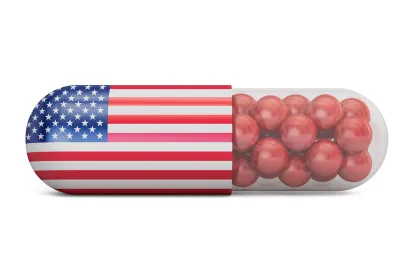Why are prescription drug prices so high in the U.S.? While this question can hardly be considered a new topic in American healthcare, the recent clash of words between the Trump Administration and Democratic Senators has once again brought focus to the issue of prescription drug prices. According to the Administration, pharmacy benefit managers (“PBMs”) and drug distributors – who President Trump has dubbed as “middlemen” – are largely to blame for higher drug prices. However, Democratic Senators, PBMs, and drug distributors have recently pushed back against the Administration’s claims, arguing that the Administration’s claims are not supported by any evidence, and, in some cases, are contrary to the core functions of PBMs and drug distributors.
Background
PBMs and drug distributors have been in the crosshairs of the Administration for several months. In a speech on May 11, 2018, President Trump outlined the American Patients First blueprint (the “Blueprint”), which outlined the approach that the Administration would pursue to lower drug prices. Among several targets for change were PBMs and drug distributors, noting that among the Administration’s top goals was “eliminating the middlemen.”[1]
The Blueprint specifically sets forth the Administration’s belief that “[b]ecause health plans, pharmacy benefit managers [], and wholesalers receive higher rebates and fees when list prices increase, there is little incentive to control list prices.”[2] The Blueprint did not, however, provide any evidence or rationale for these claims. Nevertheless, the Blueprint proposes several changes to the way that PBMs operate, including creating a fiduciary duty for PBMs, and restricting the ability of PBMs to retain a percentage of the rebate collected on behalf of health plans. The Blueprint does not, however, elaborate on the Administration’s plans for drug distributors.
United States Department of Health and Human Services (“HHS”) Secretary Alex Azar elaborated on the Blueprint’s claims during a June 12, 2018 hearing before the Senate Committee on Health, Education, Labor and Pensions, where he claimed that PBMs threatened to remove drugs from their formularies if the drug manufacturers decreased list prices.[3] Secretary Azar repeated these claims on June 26, 2018, before the Senate Committee on Finance, where he claimed that drug manufacturers who voluntarily reduced list prices would be harmed by PBMs that would prioritize competing drugs with higher prices when setting their drug formularies.[4]
Senators and Stakeholders Push Back
In a letter to Secretary Azar , Senators Elizabeth Warren (D-MA) and Tina Smith (D-MN) criticize Secretary Azar’s allegations regarding the role of PBMs in drug pricing, calling them “disturbing and serious.” [5] The Senators argue that PBMs and drug distributors hold themselves out as “key players in negotiating lower drug prices and making the market for drugs more efficient” – directly contrary to Secretary Azar’s claims.[6]
The Senators investigated Secretary Azar’s claims by reaching out to the six largest PBMs and three largest drug distributors in the United States. The PBMs unanimously indicated that they never pushed back or otherwise disadvantaged any drug manufacturer for lowering list prices. Express Scripts noted that lower list prices receive favorable formulary consideration, exactly the opposite of Secretary Azar’s claims.[7] The drug distributors gave similar answers, indicating that they did not influence or have any ability to influence the list prices for drugs. Instead, one drug distributor indicated that it negotiated fees for distribution services “agnostic of [the manufacturer’s] product pricing.”[8]
Moving Forward
The Administration appears unfazed by the questions and concerns of PBMs, drug distributors, and Democratic Senators, and has focused its attention on changes to the way PBMs operate. One manner in which PBMs aim to reduce drug prices is by negotiating rebates with drug manufacturers who want to list their products on PBM formularies. On August 17, 2018, Secretary Azar claimed that HHS has the power to eliminate rebates on prescription drug purchases. While the PBM industry contends that only Congress has the ability to change the rebate system, Secretary Azar stated that rebates were created by HHS regulations, and “[w]hat one has created by regulation, one could address by regulation.” [9]
The Secretary’s claims are likely related to a proposed rule that HHS submitted to the Office of Management and Budget (“OMB”) titled “Removal of Safe Harbor Protection for Rebates to Plans or PBMs Involving Prescription Pharmaceuticals and Creation of New Safe Harbor Protection” on July 18, 2018.[10] The OMB is still reviewing the proposed rule, and nothing is currently known about the rule beyond its title; however, Secretary Azar’s comments indicate that the rule may be aiming to adjust or eliminate the ability of PBMs to negotiate with drug manufacturers for rebates. While it is unclear exactly what will be presented in such proposed rule, it appears likely that the Administration will continue pursuing aggressive changes to the way that PBMs operate.
[1] Kerry Dooley Young, Trump Lays Out Drug Plan, Calling for More Competition, Less ‘Global Freeloading’, Medscape (May 11, 2018)
[2] United States Department of Health & Human Services, American Patients First, The Trump Administration Blueprint to Lower Drug Prices and Reduce Out-of-Pocket Costs, (May 2018)
[3] Prescription Drug Pricing, C-SPAN, (June 12, 2018)
[4] Prescription Drug Supply and Cost, C-SPAN, (June 26, 2018)
[5] Senator Elizabeth Warren & Senator Tina Smith, Letter to U.S. Department of Health and Human Services Secretary Alex Azar, August 17, 2018, at 3, Senator Elizabeth Warren & Senator Tina Smith, Letter to U.S. Department of Health and Human Services Secretary Alex Azar, August 17, 2018, at 3
[6] Id. The Pharmaceutical Care Management Association, which promotes PBMs nationwide, claims PBMs will save employers, unions, government programs, and consumers $654 on drug costs over the next decade. Pharmaceutical Care Management Association, Our Industry
[7] Senators Warren and Smith, at 4
[8] Id. at 6.
[9] Yasmeen Abutaleb, U.S. Health Secretary Says Agency Can Eliminate Drug Rebates, U.S. News, (Aug. 20, 2018)
[10] Office of Management and Budget, RIN 0936-AA08, (July 18, 2018)




 />i
/>i

